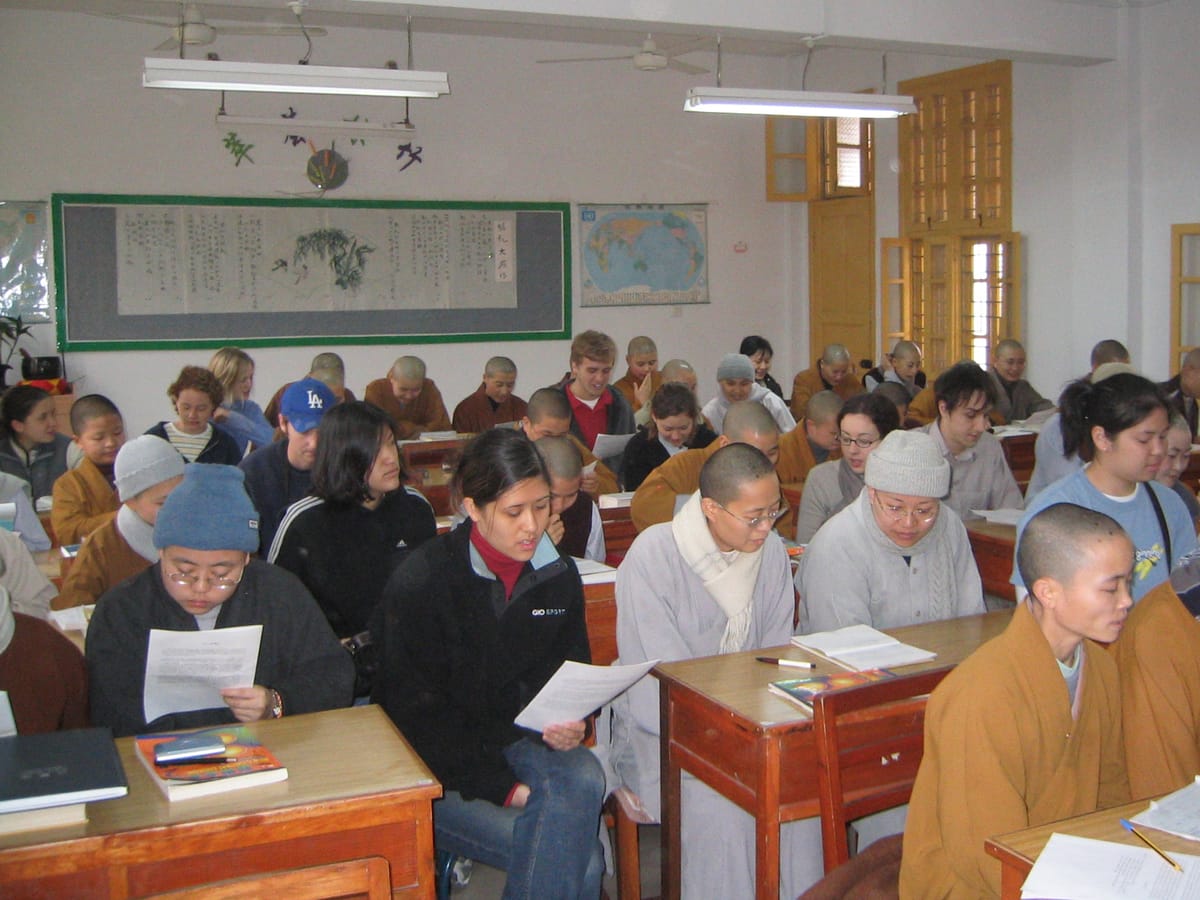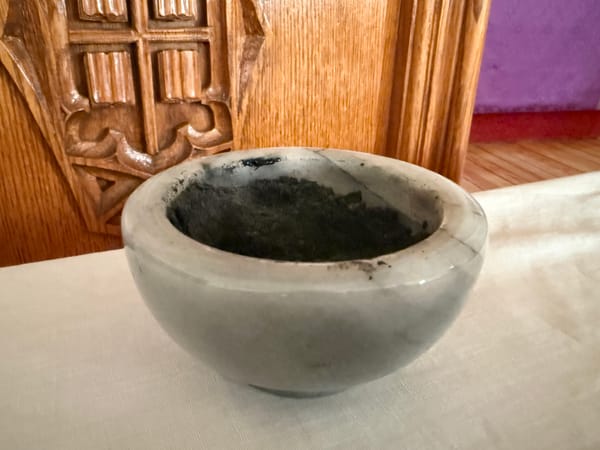Setting Everything Down to Follow Jesus
“We must not foolishly cling to things,” Ajahn Chah writes. We hold them, for a time, but we “let them go. Good or bad, we let them all go.”

September 7, 2025 - The Thirteenth Sunday after Pentecost
My friends, I speak to you today in the name of one God, Father, Son, and Holy Spirit. Amen. Please be seated.
Good morning, Epiphany. It’s good to be with you here in this place today. I promise not to preach about dreams and beds this morning... the number of you who have asked me if I have bought a new bed yet is so high; my sermon two weeks ago talked maybe a little too much about my own nightmares, my lack of sleep. Well, we did buy a new mattress, don’t worry, and it was delivered yesterday. Hopefully tonight, or even this afternoon, I’ll get to rest on it. We’ll see. Also, as you might have guessed if you listened to the gospel reading this morning, there is a part of me that wishes that I had asked Janet MacKenzie to preach this Sunday instead of last Sunday. Hate your father and mother, Jesus says... hey dad, hey mom. Hate your wife, your children, your brothers and sisters, hate even life itself. Give up all your possessions. ...Alright. This should be a fun message this morning.
First though, I want to take you back to March 6, 2004. Does anyone remember where you were 21 years ago? 2004? It’s the first term for George W. Bush, and John Kerry is running against him; Facebook was about to launch; Kanye West released his first album; the Red Sox are going to beat my Cardinals in the World Series that fall. But this is March, it’s still spring, and your future priest was in the middle of his first real cross-cultural adventure, a semester abroad in China. I’ve mentioned this semester abroad here before, but as a 19-year-old from southern Illinois, living for four months in China was a profoundly disorienting and life-changing experience. I will strongly encourage our daughters to find good semester abroad programs when they go to college, even if it will be difficult as their parent to let them go. My parents (who I am supposed to hate this morning, remember), they know how tough it is, but they did indeed let me go.
So it’s a Saturday morning that spring, back in 2004, and our group of 15 students woke up early to ride a bus to a rural Buddhist nunnery for our Chinese Culture and Religion course. If you know any of my story, you might know that a Chinese Buddhist nunnery was more than a little outside my comfort zone back then... as a conservative evangelical American Christian boy from the Midwest, this felt almost like crossing enemy lines. We were each paired with two nuns who spoke little to no English; they showed us around a bit before we sat in with them for a class. Much of that class, held in Chinese, went far over our heads, or through one ear and out the other; if you’ve ever spent time in a place where you do not know the language, you get used to not understanding everything that is going on around you. But I journaled this, and I have photos of it too: at one point, the abbess leading the class asked me if I would read a poem aloud. She thankfully gave me an English translation, and one of my assigned nuns read it in Chinese when I finished.
The poem was called “Flashlight,” written by Ajahn Chah, a twentieth-century Buddhist teacher from Thailand, and I have thought of it often over the last 21 years. It’s a few paragraphs long, and I won’t read it all this morning, but I want you to hear this last paragraph while thinking about Jesus’s last line in this morning’s challenging gospel text: “none of you can become my disciple if you do not give up all your possessions.
”The last paragraph of the translated poem goes like this: “(Letting go and not clinging to anything) is like coming here. First, you had to want to come here. If you did not want to, you would not be here today. We do things because of wanting, but when wanting arises, we do not cling to it, just like we do not cling to a flashlight – ‘What is this?’ We pick it up. ‘Oh, it’s a flashlight.’ We then put it down again. This is what ‘holding but not clinging’ means. We know and then we let go. We do not foolishly cling to things, but we ‘hold’ them with wisdom and then let them go. Good or bad, we let them all go.”
Now, that text might be easier to handle than our gospel this morning. As we read Luke 14 in community here this week, in our liturgy group on Tuesday and at healing service on Wednesday, our responses ranged from disbelief to outright denial. I mean, look at this text: “hate father and mother, wife and children, brothers and sisters, and even life itself.” Maybe Jesus just needed a sandwich before he spoke to the crowd, we joked; maybe someone should’ve brought him a Snickers. Maybe the translation here is wrong, maybe he didn’t actually say this. This isn’t the Jesus I know, many of us said. Our Jesus, our Jesus is about love. What happened to “honor thy father and mother” at the least?
And really, all of us were right, though I do believe he actually said this to the crowds. See, when you cherry-pick verses from the Bible, you really can make it say pretty much anything. It’s a big book! But when you read this morning’s gospel in the context of the entire Christian story, and especially within the context of a loving community like this one, you know something else, something is going on here. Hate is not a gospel virtue.
What, then, is Jesus saying to the large crowds who were traveling with him and his disciples in Luke 14? Well, there are at least a few important points of clarity. First, hate, in this first-century context, doesn’t mean the same thing as hate does today. In the Old Testament, we read that “Jacob loved Rachel and hated Leah.” As we may know from the context of that story, Jacob did not hate Leah in the way we think of hate, but instead, he simply loved her less than Rachel. So, it is not a conflict, it is not surprising, that elsewhere in the New Testament, in Matthew’s account, we find Jesus preaching this to his disciples with softer language: “Anyone who loves their father or mother more than me is not worthy of me, anyone who loves their son or daughter more than me is not worthy of me. Whoever does not take up their cross and follow me is not worthy of me. Whoever finds their life will lose it, and whoever loses their life for my sake will find it.”
“Hate,” then, in the context of this text, it means “love less.” Jesus knows we will love our father and mother, our spouses and our children, our siblings, and even our life, because that is good. Jesus, therefore, is urging us to be sure that we love those things, and all the things we love, that we love them less than we love Jesus, than we love God.
Now that is still quite a request from this teacher, from this man leading large crowds around Galilee and Judea. The parable he tells right before this passage, though, strangely omitted from the lectionary today, is one of excuses. It tells of people who cannot come to a banquet because they just bought a field, they just bought some oxen, they just got married. There will always be those with excuses for why they cannot come to the banquet, so the master in this parable invites everyone: “go into the streets and alleys and bring in the poor, the crippled, the lame... go out to the roads and country lanes,” he says.
Alongside that parable, of excuses, of other priorities placed before an invitation to an amazing banquet, this morning’s lesson continues to make more sense: Jesus is inviting the crowds to follow him, but they need to have their priorities straight, they need to realize that what he is offering is beyond their wildest dreams, their current expectations and loves. It is an abundant love for all, so much love that those whom the society rejects are lifted up, that no one is excluded. And if anything keeps us from that life of love, we need to set it down, we need to let it go, we really just need to love it less. We need to love our families, yes, and we need to love our own lives, our own selves, of course, but we also need to love everything less than we love the radical, life-changing love of God.
Now that is not an easy call. I’m not pretending this morning that reframing “hate” as “loving less” makes this a simple passage to digest. There’s a reason this passage is titled “The Cost of Being a Disciple,” in our translation, and titled “The Cost of Discipleship,” in another, which will bring about thoughts of Dietrich Bonhoeffer for many of you. His book, The Cost of Discipleship, called for us to live out our faith in radical ways, called for us to take this Jesus stuff seriously. And that’s what the call is for us this morning too.
Love is not always easy, but it is always the best path. Jesus knows this. Jesus, by calling us to follow him, he is trying to free us from absolutely anything that keeps us imprisoned, anything that keeps us from seeing all others as beloved children of God, anything that keeps us in our own protected tribes, anything that keeps us from living the life of love that we could be living, the only life that will truly give us peace and joy.
And in that context, Jesus ends this passage by calling us to give up all our possessions too. Goodness, Jesus, come on. Love your families less, love yourself less, realize how much this will cost you, and give up all your possessions. “None of you can become my disciple if you do not give up all your possessions.” Last point, this morning, I promise.
A biblical scholar I read this week pointed out that in the Greek, the word we use here for possessions could also mean simply possessing. People did not have storage units of stuff back in the first century, remember; possessions could really refer to “anything or anyone at your disposal, anything or anyone you hold on to or claim as your own.” This call then, to be able to give up possessions or possessing, well, it echoes the wisdom of Ajahn Chah, the Buddhist teacher I read in China... or probably more accurately, Ajahn Chah was echoing Jesus. “We must not foolishly cling to things,” the Buddhist wrote. We hold them, for a time, but we “let them go. Good or bad, we let them all go.”
Friends, this morning, I ask you to read this gospel passage that feels harsh and read it realizing that following Jesus is not always easy, but it is so, so good. Following Jesus allows us to let go of that which controls us and gives us nightmares and keeps us up at night: our anxieties, our fears, our burdens. Following Jesus allows us to let go of our concerns about everything we hold dear: our possessions, our causes, our nation, and yes, in the end, even our loved ones. Because following Jesus allows us to rest in God’s love, and to live in God’s love, knowing all we can do ourselves is love, and love abundantly.
Lay down your burdens, Epiphany, and take up the cross of love as we follow Jesus together. Love the Lord, and welcome and love each other abundantly and without fear.
Amen.




